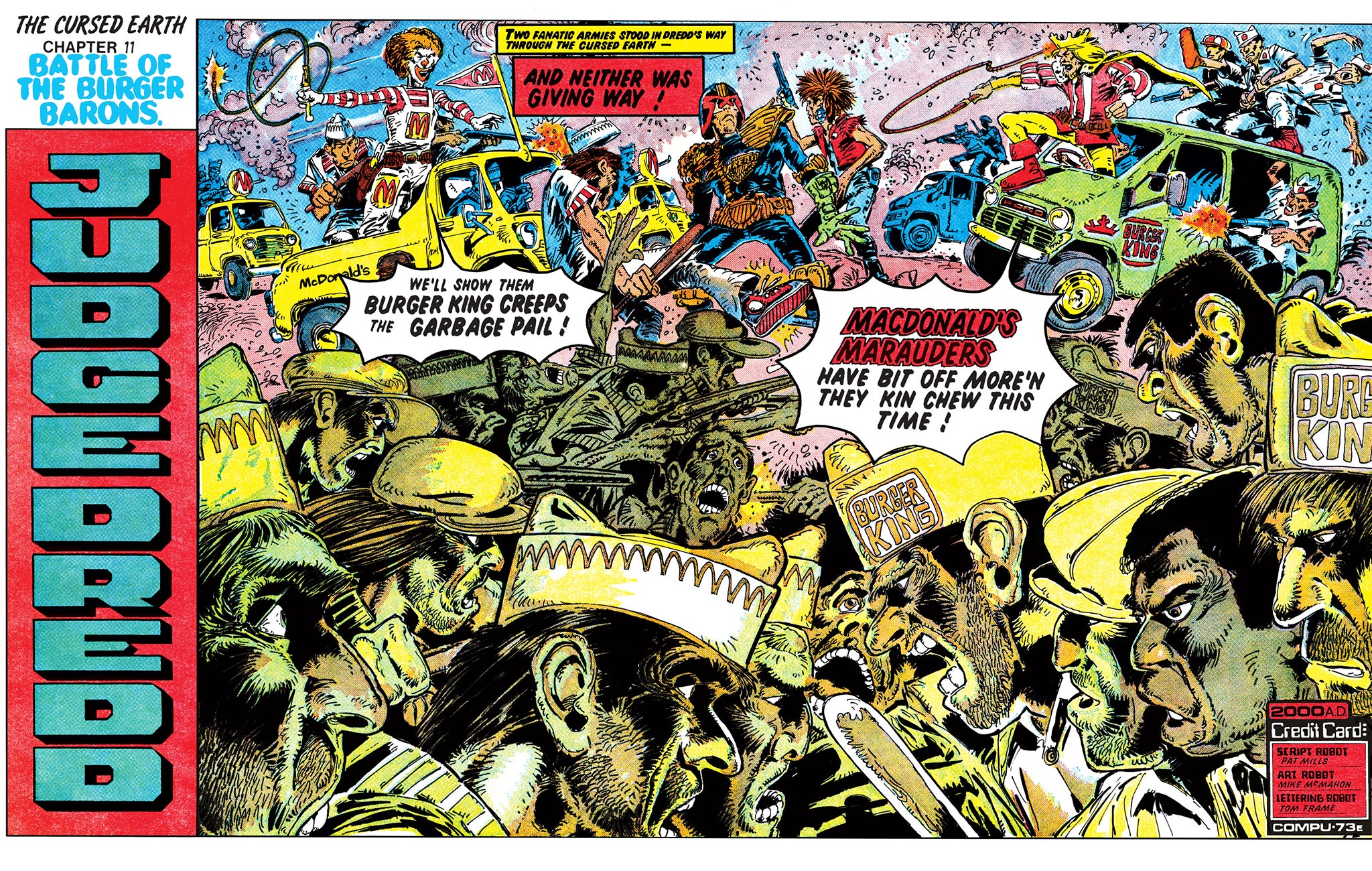Judge, jury and executioner of consumer culture
Having put lawyers in a spin during the Seventies, previously censored Judge Dredd storylines finally see the light of day

Judge Dredd – as any comic reader will know – is The Law. But while the much-loved character has seen off mutants, cyborgs and gangsters in the almost 40 years he’s been appearing in the pages of British weekly 2000 AD, he’s never been able to beat the massed ranks of his own corporate solicitors. Until now, that is. Because a series of comic strips featuring the granite-faced far-future lawman, which were the subject of a self-imposed publishing ban back in 1978, are finally going to see the light of day again.
Dredd – a black leather and helmet-wearing “judge, jury and executioner” who pounds the mean streets of Mega-City One in a post-apocalyptic America – was introduced in the second issue of 2000 AD in 1977. One of the epic episodic storylines took him to the Cursed Earth – the irradiated wasteland outside the walls of Mega-City One on the US eastern seaboard – where he encountered mutated freaks and grotesque villains… and among them were characters who resembled some iconic consumer culture mascots a little too closely for publisher IPC’s in-house lawyers.
In the story "Burger Wars", written by veteran Dredd scribe John Wagner (under the pen name TB Grover) and drawn by Mike McMahon, the Judge gets embroiled in a battle between the remnants of two of America’s biggest burger chains, which have devolved into warring factions headed up by the Burger King and a familiar if eerie mutated clown called Ronald, who runs MacDonald (sic) City. And in "Soul Food", by Jack Adrian and Brian Bolland, Dredd comes up against a scientist who has genetically engineered a Jolly Green Giant just like the mascot of the popular corn brand, and a Michelin-style tyre-creature.
2000 AD, a descendant of the controversial and violent Action comic, has always pushed the boundaries and - according to Mike Molcher of Rebellion, the company that has published it since the turn of this century - has always had a satirical edge. But the legal team of the then-publisher IPC, having seen these issues, got twitchy.
“There were no actual approaches from McDonald’s solicitors, Molcher says, “but the lawyers at the time decided to self-censor for fear that there would be action. It was decided that those comic strips would never be printed again.”
While there have been reprints of classic Dredd stories in the intervening years, the Cursed Earth storyline has had to be skipped, replaced with an editor’s note explaining why the episodes were absent. Until now, originals have gone for silly money on eBay. But in July, Rebellion is finally publishing Judge Dredd: The Cursed Earth Uncensored, thanks to a relaxation of the laws governing parody and satire, which took effect at the end of 2014.
According to Mark Stephens CBE, a specialist lawyer in media and intellectual property (among other areas), the laws governing satire did indeed change, but there is still danger for those who think they can just lift corporate trademarks for their own businesses, as opposed to parodying them for entertainment purposes.
“We have now got this satire defence,” says Stephens, “and while there is something of a loophole there regarding trademarks, it doesn’t apply to this case. The reality is that only a moron in a hurry would confuse a Judge Dredd comic strip with a greasy burger… or, if we’re being more generous, let’s say confuse it with a food shop.”
In other words, while a garish clown wearing a badge with an M on it in the pages of a comic strip might well put you in mind of McDonald’s burgers, you’re hardly going to think that 2000 AD has ripped off the trademark character to promote its own business.
Of course, Mark Stephens has history with McDonald's: he advised the defendants in the so-called “McLibel” case of the 1990s, brought against two environmental activists for handing out leaflets outside the chain’s outlets. But he’s not backing down.
“There’s a proper balance to be struck between satire and comment,” he says. “Lawyers think something like this portrays the brand in a potentially negative way, that it somehow dilutes the brand. But corporations are being too thin-skinned. They need to not be corporate, capitalist running dogs and to accept free speech.”
Back in 1978, in a bid to offset any potential action, 2000 AD ran a half-page follow-up strip to the Green Giant storyline in which Judge Dredd and his compatriots are seen to be enjoying cans of sweetcorn. But finally, caution has been thrown to winds and the Cursed Earth saga is going to be re-released in a handsome hardback edition (which has involved Rebellion sourcing and borrowing original artwork from fans who themselves have bought it from artists over the years).
So after 40 years upholding the law - often brutally and with extreme prejudice – Judge Dredd has finally got justice for himself, and can now add the “corporate, capitalist running dogs” to his tally of triumphs.
‘Judge Dredd: The Cursed Earth Uncensored’ (Rebellion, £25) is released on 14 July
Subscribe to Independent Premium to bookmark this article
Want to bookmark your favourite articles and stories to read or reference later? Start your Independent Premium subscription today.

Join our commenting forum
Join thought-provoking conversations, follow other Independent readers and see their replies